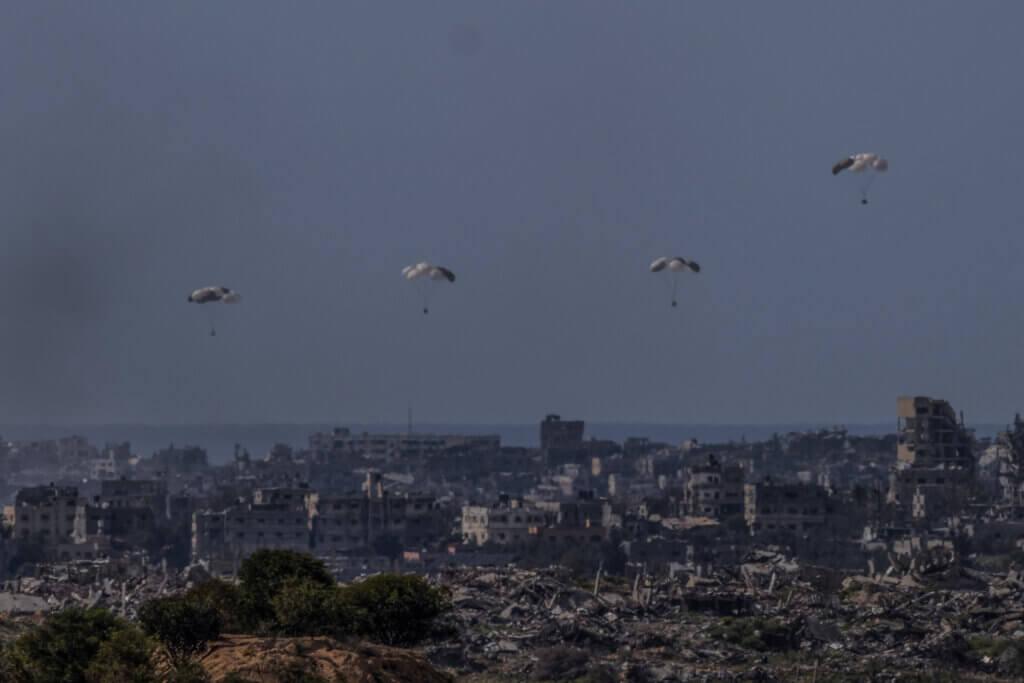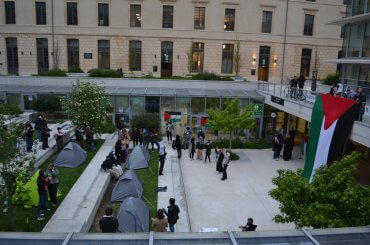Casualties:
- 30,960+ killed* and at least 72,524 wounded in the Gaza Strip.
- 424+ Palestinians killed in the occupied West Bank and East Jerusalem**
- Israel revises its estimated October 7 death toll down from 1,400 to 1,147.
- 587 Israeli soldiers killed since October 7, and at least 3,221 injured.***
*Gaza’s Ministry of Health confirmed this figure on its Telegram channel. Some rights groups put the death toll number closer to 35,000 when accounting for those presumed dead.
** The death toll in West Bank and Jerusalem is not updated regularly. According to PA’s Ministry of Health on March 6, this is the latest figure.
*** This figure is released by the Israeli military, showing the soldiers whose names “were allowed to be published.”
Key Developments:
- At least twenty people killed in Israeli air raids across Gaza last night.
- Three more children died of starvation in al-Shifa’ Hospital, bringing total number of deaths by starvation to 23.
- At least eighteen children have died from malnutrition.
- Palestinian Prisoners Society: 15 people arrested during two days of Israeli military raids in West Bank.
- Spanish vessel, Open Arms, scheduled to set sail from Larnaca to Gaza this weekend.
- Israeli settlers desecrate tombstones at Islamic cemetery in East Jerusalem.
- Pentagon: Biden’s proposed floating pier to deliver aid to Gaza will take two months and 1,000 troops to construct.
- UNRWA: Land crossings most efficient way of bringing aid to Gaza.
- No country has claimed responsibility for the humanitarian aid drop that failed to land and killed five people.
- CENTCOM: US, allies intercept fifteen drones belonging to Yemen.
In Gaza, the child deaths we feared are here
The Israeli-engineered humanitarian catastrophe in Gaza has claimed its latest victims as three more children die of starvation at al-Shifa’ Hospital. At least eighteen children have died of malnutrition in Gaza.
“Ali was born in wartime, and there was no food or anything for his mother to eat — a matter which caused his kidneys to fail,” a Gaza man whose son died of malnutrition told the BBC.
“Ali’s life got worse day after day. We tried to get him treated at hospitals, but there was no help…Ali died in front of the entire world, which kept watching him pass away.”
NGOs and humanitarian aid agencies have been warning about this for months now — malnutrition screenings carried out by UN agencies in northern Gaza in January found that one out of every six children was malnourished, and that without urgent humanitarian aid deliveries, this was bound only to get worse.
It is a deliberately-engineered Israeli strategy in which all means of Gaza’s subsistence have been obliterated. Israel’s relentless bombardment has targeted farmlands and destroyed bakeries, while Israeli soldiers have regularly targeted fishermen. Meanwhile, the price of even basic food items — when accessible — has skyrocketed over the past few months, and Israel continues to impede the delivery of humanitarian and food aid to northern Gaza.
Making matters worse, people who have been displaced are now crowded into shelters and camps where hygiene conditions are dismal, causing the spread of infectious diseases. Now, the lack of nourishment is making the effects of these diseases even worse — all of which would be treatable, if not avoidable, were adequate food and medicine allowed into the Strip.
“It is often that a child is extremely malnourished, and then they get sick and that virus is ultimately what causes that death,” Heather Stobugh, a malnutrition expert at Action Against Hunger, told The New York Times.
“But they would not have died if they were not malnourished.”
Five die in a humanitarian aid drop gone wrong
Over the weekend, a humanitarian aid drop killed five people in Gaza when the parachute of the aid doxes failed to open, raising questions over whether this method of humanitarian relief is even safe.
According to a witness on the ground, the package dropped “like a rocket” when the parachute did not open. No country has claimed responsibility for the disaster. The United States, Jordan, Egypt, France, and the Netherlands are all currently sending airdrops.
Meanwhile, maritime corridors continue to be discussed as a potential alternative to opening the land border, which presents logistical obstacles. The Spanish vessel, Open Arms, is scheduled to set sail from Larnaca to Gaza, but there is no logistical plan in place for what happens when the aid arrives. With no functioning port and shallow waters, it is unclear how the ship will be able to physically dock in Gaza, while a logistical plan for distributing the aid once it arrives remains unknown.
Nevertheless, the team from the Opens Arms, which is stocked with 200 tonnes of food provided by the U.S. charity, World Central Kitchen, is optimistic that they will be able to rise to the challenge.
“What initially appeared as an insurmountable challenge is now on the verge of realization,” read a post on the Open Arms X account.
“Our tugboat stands prepared to embark at a moment’s notice, laden with tons of food, water, and vital supplies for Palestinian civilians.”
Skepticism over the viability of maritime corridors in the United States continues to rise as the Pentagon reveals that it could take as long as two months and as many as 1,000 U.S. troops to construct U.S. President Joe Biden’s proposed “temporary piers” in Gaza, raising further doubts as to whether the plan to open a maritime corridor to allow humanitarian aid into the Strip is actually viable.
“The US plan for a temporary pier in Gaza to increase the flow of humanitarian aid is going to be a distraction from the real problem: Israel’s indiscriminate and disproportionate military campaign and punishing siege,” said Avril Benoit, the Executive Director of Doctors Without Borders. “The food, water and medical supplies so desperately needed by people in Gaza are just sitting across the border. Israel needs to facilitate rather than block the flow of supplies. This is not a logistics problem; it is a political problem. Rather than look to the U.S. military to build a work-around, the US should insist on immediate humanitarian access using the roads and entry points that already exist.”
Some believe that the proposed corridor was a political ploy by Biden — who felt pressured to “say something” about Gaza but was unable to announce a ceasefire.
“I think it’s one of the main purposes for making this announcement at this particular time,” Sultan Barakat, a professor of public policy at Hamad Bin Khalifa University, told Al Jazeera. “He had hoped to present a ceasefire. That wasn’t happening, so this was a convenient second choice.”
Nevertheless, the U.S. military appears to be going ahead with the plan, despite heavy criticism from the international humanitarian aid community.
“We are in the process of identifying, sourcing and in some cases, pairing [sic] forces to deploy,” said Pentagon Press Secretary Major General Patrick Ryder, as reported by CNN. “But I can confirm that the elements of the 7th Transportation Brigade Expeditionary Joint Base Langley Eustis in Virginia have been tasked to support.”
Even though any increase in aid is welcome, UNRWA spokesperson Juliette Touma says that land crossings are still the most efficient way to bring humanitarian aid into the Gaza Strip — focusing on air drops or maritime corridors is just a distraction, the UNRWA spokesperson emphasized..
“This is what we used before the war in Gaza, when there was a regular flow of about 500 trucks per day, including commercial supplies,” Touma told Al Jazeera.
But since the siege tightened, things have changed.
“There has been very little aid coming in–authorisations to UNRWA and other UN agencies have not been given sufficiently,” she continued. “There needs to be much more.”
Israeli settlers deface tombstones in East Jerusalem, military raids and arrests across West Bank
Israeli settlers have desecrated tombstones at a historic Islamic cemetery sharing a wall with the al-Aqsa Mosque compound in East Jerusalem, raising fears that more violence will escalate and tensions will boil over during the upcoming holy month of Ramadan.
Meanwhile, in the West Bank, raids targeted Tulkarem, Jenin, Bethlehem, and Qalqilya, with Israeli soldiers arresting fifteen people over the course of two days. Last night, Israeli forces deployed bulldozers and live rounds of ammunition in a raid on the Nur Shams refugee camp outside of Tulkarem, destroying roads, waterlines, and greenhouses.
Israeli settler violence across the West Bank is on the rise as well, with a fresh wave of attacks targeting both the Masafer Yatta area outside of Hebron and the village of Burqa near the city of Ramallah, wounding two Palestinians and setting a house on fire.



How will it end? Ami Ayalon, ex head of Shin Bet, has been giving interviews all over the media – he’s appeared on Al-Jazeera, Foreign Affairs, Ha’aretz – here’s his interview in The Guardian:
A former leader of the Shin Bet domestic security force has said Israel will not have security until Palestinians have their own state, and Israeli authorities should release Marwan Barghouti, jailed leader of the second intifada, to direct negotiations to create one…. [he] also said destroying Hamas was not a realistic military goal, and the current operation in Gaza risked entrenching support for the group…“We cannot accept [the idea of a Palestinian people] because if we do, it creates a huge obstacle in the concept of the state of Israel.”…He believes releasing Barghouti, a Palestinian who has been jailed since 2002, serving a life sentence for murder after leading the second intifada, would be a vital step towards meaningful negotiations….Ayalon said attempts to normalise a Middle East in which the Palestinians did not have a state or much hope of one, was one of the factors in Hamas launching the attacks on 7 October….“I’m so upset that we are not willing to discuss the day after. Because I know what happens to wars without a political goal. The war becomes a goal in itself, instead of being a means to achieve a political goal,” he said. “We are experts: this is exactly what happened to us in Lebanon, this is exactly what happened to us in the West Bank. And I am afraid that this is what will happen if we go on fighting without defining a clear essence of victory. What is a victory?”… We believe that security will be achieved if we conquer, if we occupy, only by military power. And what [the] Yom Kippur [war] proved to us, is we shall suffer violence because of the occupation. Occupation will not bring us security, it brought us violence and death.”
https://www.theguardian.com/world/2024/jan/14/shin-bet-ami-ayalon-calls-on-israel-release-intifada-leader-marwan-barghouti
Reuters: “Israel strikes landmark residential tower in southern Rafah as truce talks stall”
https://www.reuters.com/world/middle-east/israel-strikes-landmark-residential-tower-southern-rafah-truce-talks-stall-2024-03-09/